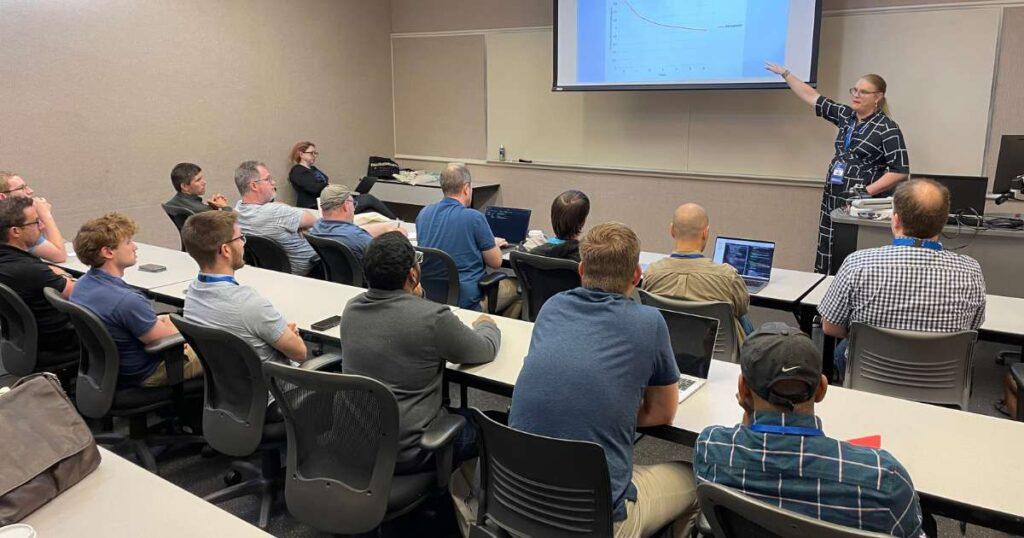Four Software Development Specialists from SEP Speak at Indy.Code() 2023

At Indy.Code() 2023, the campus of IUPUI was buzzing with innovation around all things software development. Four seasoned product development specialists from SEP took to the stage, sharing their expertise and insights spanning from the realm of probabilistic forecasting that fuels smarter decision-making to unveiling the potential of crafting custom AI software applications for highway maintenance.
Overall, the conference served as an inspirational hub for fostering growth, exploration, and connection in the heart of downtown Indianapolis.
Check out each of the full session videos below:
- Answering the Question, “When will it be done?” Using Probabilistic Forecasting – Chris Shinkle, Director of Innovation
- A Technical Deep Dive Into Containers – Paul Steele, Senior Software Engineer
- AI For Highway Maintenance – Jordan Thayer, AI Practice Lead
- Can We Learn to Manage Uncertainty? Probably! – Robert Herbig, Lead Software Engineer
Answering the Question, “When will it be done?” Using Probabilistic Forecasting
Chris Shinkle
Director of Innovation
About This Talk
“When will it be done?” How often have you been asked that question? It’s a question that strikes fear or frustration in most people. It often results in someone throwing up their hands in frustration or tossing out a wild guess. Surely there’s a better way?
Forget story points, t-shirt sizing, and historical averages. Have you considered building a simple forecasting model that provides a range of possible outcomes with confidence levels?
Though often the punch line of a joke, weather forecasting—specifically hurricane forecasting—has gotten surprisingly good over the past few decades. This increased accuracy is mainly due to applying techniques like Monte Carlo simulation and continuous forecasting.
In this talk, we will explore those same practices and discuss how you might leverage them to answer the question, “When Will It Be Done?”. We will walk through some examples and explain how to get up and running quickly.
Answering the question “When will it be done?” will no longer create frustration or fear like it once did.
A Technical Deep Dive Into Containers
Paul Steele
Senior Software Engineer
About This Talk
Containers have become an invaluable tool in the developer’s toolbox, but how do they work exactly?
A lot of times, the discussion ends with “They’re more lightweight than virtual machines,” – but there is a lot more going on under the hood. There are decades of history and an amalgamation of different tools that lead to the modern-day container.
This talk will explain and showcase the differences between various container technologies, such as Docker, containers, and runc to name a few. Each technology will be explored in depth to help attendees gain a solid working knowledge of how containers work behind the scenes.
AI For Highway Maintenance
Jordan Thayer
AI Practice Lead
About This Talk
Software touches every aspect of our lives, and nowhere is that clearer than in the automotive industry. With the recent surge to AI for self-driving cars, we lose sight of adaptive cruise control, anti-lock breaks, and in-cab media centers that all require software to operate.
However, did you realize that software is fundamental in the streets you drive on? This talk is a post-mortem of a prototype system we built for optimizing the use of municipal funds for highway maintenance in the state of Indiana. While the optimizer is a central piece of the system, it wasn’t the whole system or even the most challenging problem!
In this talk, we’ll cover:
- The general problem of highway maintenance
- How users’ acceptance and understanding may be a more critical metric than pure cost optimization
- How to build AI in an agile manner
- How AI was merely a part of a much larger system
- What changes when your software has to change hearts and minds and accomplish a technical task?
I’m hoping the audience takes away:
- Sometimes the best technical solution isn’t the best overall solution
- Even when AI is required for a product, it is never the whole product
- No piece of software, no matter how complex, is not approachable with agile techniques
Can We Learn to Manage Uncertainty? Probably!
Robert Herbig
Lead Software Engineer
About This Talk
When we’re asked when something will be done, it’s tempting to answer the question. “It’ll be done on March 32nd,” “It’ll take 182.5 days,” or “We need 15 sprints”. It doesn’t matter if that answer is the best-case, average, or worst-case scenario.
The answer is fundamentally wrong because using a single value hides the fact that what we really meant was a distribution of possible dates, durations, or outcomes. The exact value is uncertain. Development may be faster or slower than we thought. What if the tech lead wins the lottery and retires? What if a global pandemic forces us to change the way we work?
While we can’t control any of those factors, we can be mindful of their existence and communicate more clearly. In this talk, we will introduce “bet” language, which makes uncertainty and luck an explicit part of the conversation. This mindset helps us accurately assess risks, pick the right risks to embrace, and avoid analysis paralysis. It also helps us learn in an uncertain world, where even if we make good decisions, we may experience bad outcomes (and vice versa!).
Bringing big ideas to life.
We’ve spent decades crafting innovative product solutions as top software development specialists in Indiana.